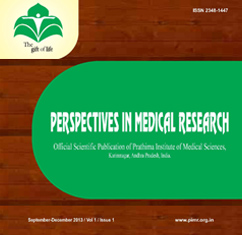
Original Article - Abstract
Year : January - April 2015 | Volume : 3 | Issue : 1 Page : 12 - 16
Trupti Bodhare,1,Vidhya Wilson2,Sandeep D3
1Professor, Department of Community Medicine, 2Associate Professor, Department of Community Medicine, 3Postgraduate student, Department of Community Medicine, Prathima Institute of Medical Sciences, Karimnagar, Telangana, India.
Corresponding Author: Dr. Trupti N Bodhare, Professor, Department of Community Medicine, Prathima Institute of Medical Sciences, Karimnagar, Telangana, India.
Email: [email protected]
Introduction:Patients with ESRD are highly susceptible to the psychiatric illnesses of which depression is the most common illness. Depression affects the outcome through its effects on the underlying disease, compliance to treatment, nutrition, immunity, marital & family dynamics and through access to care. Studies assessing the prevalence of depression and its associated risk factors among the patients of end stage renal disease will help in planning appropriate measures for its prevention and management.
Materials and Methods: A cross-sectional descriptive study was carried among 60 patients suffering from ESRD, undergoing maintenance hemodialysis in the dialysis unit of the institute during July-September 2014. A semi-structured questionnaire was used to evaluate the socio-demo graphic and disease related factors. Depression was assessed using a validated Telugu version of the patient health questionnaire (PHQ 9). Data analyzed, includes numbers, percentages, mean values with standard deviation. A multiple linear regression analysis was used to assess the various risk factors for depression.
Results: : The mean age of patient was 44.53±13.55 years, 46(76.7%) were male, 33 (55%) were belonging to upper lower class and 17(28.3%) patients were having past history of depression. A total of 38 (63.3%) were having major depressive symptoms and 28 (46.7%) were categorized as having moderately severe depressive symptoms. Lower socioeconomic status (p=0.045), past history of depression (p=0.009) and awareness about the poor prognosis (p=0.003) were significantly associated with the depressive symptom scores among the studied sample.
Conclusion: : Depression is a common psy chiatric condition among the patients with end stage renal disease and has often remained undetected and undiagnosed. It has been associated with the increased mortality. Identifying and treating depression among these patients is imperative in order to reduce the burden of morbidities and mortality among these patients.
Keywords :Stage Renal Disease, Depression, Risk factors

Open Access
Perspectives in Medical Research is committed to keeping research articles Open Access.Journal permits any users to read, download, copy, print, search, or link to the full texts of these articles...
Read more
